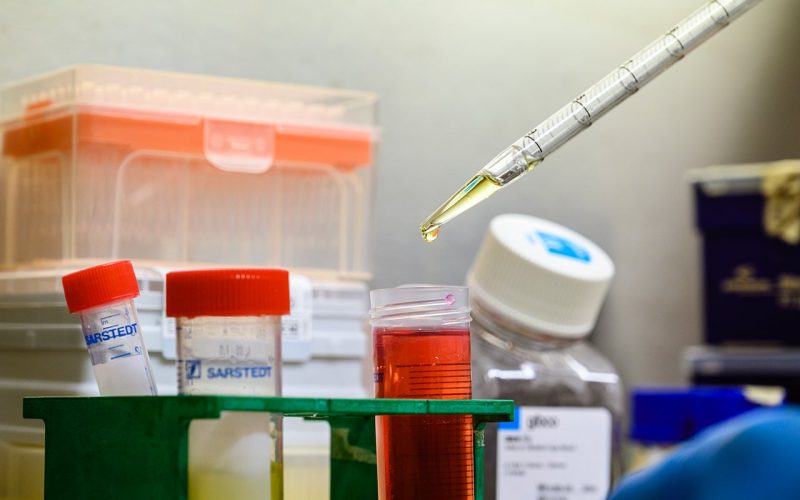Researchers at UMC Utrecht together receive nearly 2.2 million euros from KWF Kankerbestrijding. In addition, KWF and the Heart Foundation together contribute 2.3 million for research at UMC Utrecht and Amsterdam UMC. This means a total of five applications from UMC Utrecht will be honored: from research into preventing heart damage after cancer treatment to research into new techniques for making metastases visible.
Chemotherapy treatment often causes damage to the heart. This often eventually leads to heart failure. Researchers at UMC Utrecht and Amsterdam UMC are conducting research into preventing heart damage in people with lymphoma. One in ten patients who receive R-CHOP chemotherapy for lymphoma will experience heart failure. The heart then has less pumping power. And it’s dangerous, too: two-thirds of people with heart failure die of heart failure five years after initial hospitalization.
So it is important to help prevent heart failure, says internist-hematologist at UMC Utrecht Anna van Rhenen. She is conducting the research together with Marijke Linschoten, physician-researcher in cardiology at Amsterdam UMC. “More and more people are cured of cancer, or live longer with it. So there are also more and more people who have to live with the consequences of the disease and cancer treatment. If we can reduce the damage to the heart, we can also improve the quality of life.” The research now focuses on lymphoma cancer patients, but could potentially be useful for other types of cancer as well.
The researchers are focusing on two issues: does it help to administer dexrazoxane before chemotherapy and can it better predict which people will experience heart failure? “Dexrazoxane is a long-established drug that is now hardly used in daily practice. We are going to investigate whether it helps to administer the drug preventively. In addition, with this study we are going to collect data to better predict which patients are at risk of heart damage from chemotherapy.”
Read more about the other honored studies.
Roxanne Gal will use her KWF grant (€835,377.30) to improve research into the treatment of bone metastases. New treatment options are keeping more and more cancer patients alive. Some of them face complications, including painful metastases in the bones.
Research into the optimal treatment of such metastases in the bones is often laborious. This is partly because too few patients participate in research. Gal is therefore going to merge an existing cohort with patient data with a cohort from Erasmus MC and also extend it to other academic hospitals (LUMC and RadboudUMC) to enable better research.
Tobias Dansen is the recipient of a KWF grant (€730,493.90) and, together with Ruben van Boxtel of the Prinses Máxima Center, will conduct fundamental research into the role of reactive oxygen in the development of DNA mutations. Some of these DNA mutations may eventually lead to cancer. It is known that some metabolic processes in the cell can release too much reactive oxygen. These molecules can oxidize and damage DNA. To counteract this, some people take antioxidants such as vitamin C and vitamin E.
But the exact role that reactive oxygen plays in the development of DNA mutations, and ultimately, therefore, possibly cancer, is still largely unknown. Among other things, it seems to matter exactly where in the cell – for example, in the nucleus or precisely in the mitochondria – the reactive oxygen originates. The answers to these questions about reactive oxygen can help, among other things, in giving advice on prescribing antioxidants.
With his KWF grant (€ 383,460.30), Onno Kranenburg is going to conduct research, in collaboration with Max Lahaye of the Netherlands Cancer Institute, the research institute of the Antoni van Leeuwenhoek, into new techniques to make metastases in the abdominal cavity visible in patients with colon cancer. The only possible treatment for this is very serious surgery. It is therefore important to be able to assess in advance as well as possible who will and will not benefit from such an operation.
A new imaging technique called ‘diffusion-weighted magnetic resonance imaging’ (DW-MRI) was previously developed to be able to visualize the metastases as well as possible in advance. The researchers now want to combine DW-MRI with PET scans that visualize a newly discovered specific protein (the FAP protein, found in 90% of abdominal cavity metastases). He is doing this with FAPI, a radioactive substance that binds strongly to FAP. With this “detection molecule,” the abdominal cavity metastases become visible on the PET scan.
With a combination of DW-MRI and FAPI-PET, Kranenburg and Lahaye expect to greatly improve the diagnosis of metastases in the abdominal cavity.
Hjalmar van Santvoort is researching the treatment of pancreatic cancer. Often patients receive a very invasive surgery. After surgery, there is a high risk of life-threatening complications. It was previously shown that an algorithm can help predict and prevent dangerous complications, such as leakage of pancreatic juices into the abdominal cavity. This algorithm proved effective, although patients experienced the monitoring after their surgery as very intensive.
Van Santvoort will use his KWF grant (€ 231,552.00) to further optimize the algorithm. For this purpose, he wants to improve, among other things, the patient selection beforehand and the cut-off values with which the algorithm measures vital functions and blood values. The research is being conducted in collaboration with St Antonius Hospital in the Regional Academic Cancer Center Utrecht (RAKU).
